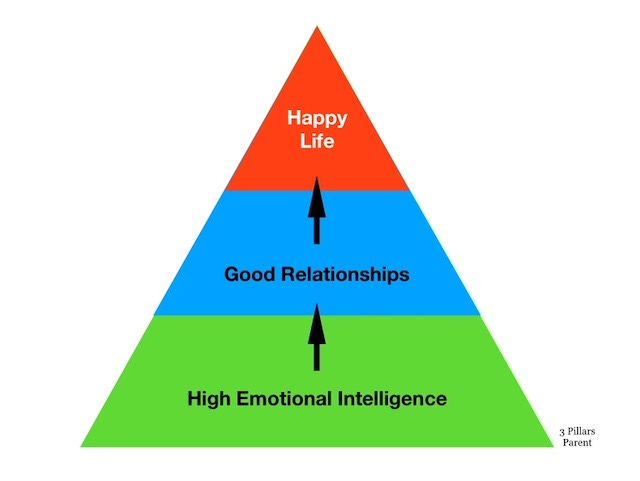When a choice is not a choice, the most important skill, and a baby Sandhill Crane
The Art and Science of Parenting #3
By: Catherine Lynch and Glenn Collins
Dear awesome parent,
It's spring-break time of year!
Eventually your kid will be making their own spring break choices, and you can set them up for success by giving them lots of opportunities now to make choices and feel consequences. Well, it turns out there's nuance to this choice-giving-thing. (Of course there is.) Here's a story about how it can go wrong, and what to do instead.
When a Choice is not a Choice
A little girl wanted ice cream. One of our Mastermind members was in a casual restaurant where she saw a little girl asking her mother for ice cream. Instead of answering “Yes” or “No”, the mother said, “You don’t really want ice cream, do you? It’ll make you fat.”
The mother didn’t want her daughter to have ice cream, but didn’t want to tell her “No”. Instead, she put the decision back on her daughter, but phrased the “choice” in a way that made it clear she disapproved of her daughter’s desire to have ice cream.
This was no longer a choice about ice cream. For the daughter this had become a choice about whether or not to disappoint her mother, face her displeasure, and possibly damage their relationship. A parent’s approval or disapproval is incredibly important to kids.
The mom’s heart was in the right place. She knew it’s good for kids to practice making decisions, and she didn’t want her daughter to make an unhealthy food choice. So she made it easy for her daughter to practice making good decisions. Right? Well,…not really.
Not when a “choice” is not really a choice. Not when choosing what she wants means defying her mother’s unstated but obvious desires. In this case, is the daughter really practicing “making decisions for herself”?
Parents have more power than kids. When there’s a power-imbalance in a relationship, the person with more authority can use it to get the other person to “agree” to things they don’t really want. If done regularly, it can lead to anger and resentment; which in turn can play out behaviorally as lying, sneaking, or passive aggression. This is not how to have a healthy, trusting relationship with your kid.
Parenting is about leadership and sometimes that means saying “No”. When you do give them a choice, make sure its a real choice, not just you trying to get them to make the “right” choice, ie. the one you want them to make.
Here’s how:
Be clear and consistent about your values. Talk about why you hold them, and be prepared to say “No” to stick to them.
Be empathetic when they want things and experiences that aren’t aligned with your values.
Ask yourself if there’s a way to say “Yes” to the feelings underlying their request, even if not the request itself.
How would you have handled this situation?
Hit reply and let us know.
What We've been Thinking About: The Most Important Skill
Emotional Intelligence (EI) - the ability to recognize and manage your own, and others’, feelings - is the single most important skill you can help your kid learn to set them on a path to a happy and successful life. That’s a bold statement, but there’s lots of research back it up. Let’s have a look:
Happiness
We all want our kids to be happy. Not just while they’re growing up, but for their whole lives. So just what makes for a happy life? This question has been pondered for millennia. Purpose, faith, accomplishments, fame, money, and power have all been put forward as answers. While some of these things might contribute to a happy life, none is a truly universal answer.
What does seem to be universal is that having good relationships with the people in our lives makes us happy. Researchers at Harvard came to this answer based on the longest running study of adults ever performed. (This Link is to a TED talk about the study). The conclusion reached from the study is unequivocal:
“Good relationships keep us happier and healthier. Period.”
So what’s the connection with Emotional Intelligence? Simple. A series of studies by Schutte, et al (2001) showed a significant correlation between high EI and thriving relationships. Thus, there is a straight line between high EI and happiness:
Emotional Intelligence was directly linked to well-being in research published by Ana Dimitrijevic, et al (2018). One of the principle findings of their study was:
“Emotional intelligence had a direct effect on well-being, unrelated to sociology-economic status or age.”
Success
We all want our kids to be successful, and high Emotional Intelligence is the surest way to help them achieve it. Research conducted by TalentSmart tested 34 important workplace skills, and found that:
“emotional intelligence is the strongest predictor of performance, explaining a full 58% of success in all types of jobs.”
They also found a direct link between EI and salary:
“every point increase in emotional intelligence adds $1,300 to an annual salary. These findings hold true for people in all industries, at all levels, in every region of the world.”
Luckily, Emotional Intelligence is a skill, and like any other skill it can be learned and improved on.
Here’s 3 easy ways you can help your kid improve their EI today:
Talk about feelings. A lot. Yours, theirs, and the people you encounter. Identify the feelings (or make your best guess) and discuss how they might cause people to act a certain way or make certain decisions.
Talk about the feelings of people in movies, cartoons, videos and books.
Talk about and guess the feelings of pets and other animals you encounter and why their feelings might make them do what they do.
Remember, the goal is only to get 2% better. 2% may not sound like much, but it compounds over time like money in the bank, and that’s where the magic lies.
High EI is also linked to better physical and cognitive health but we’ll save that for another article. 😃




